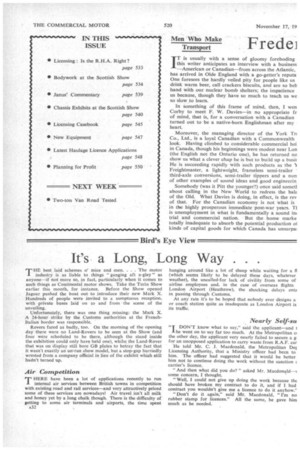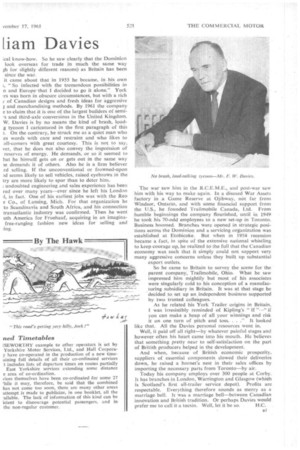Men Who Make Transport
Page 34

Page 35

If you've noticed an error in this article please click here to report it so we can fix it.
Frede] Fiam Davies
IT is usually with a sense of gloomy foreboding this writer anticipates an interview with a business —American or Canadian—from across the Atlantic, has arrived in Olde England with a go-getter's reputa One foresees the hardly veiled pity for people like us drink warm beer, call crackers biscuits, and are so beb hand with our nuclear bomb shelters; the impatience us because, though they have so much to teach us we so slow to learn.
In something of this frame of mind, then, I wen Corby to meet F. W. Davies—in no appropriate fr of mind, that is, for a conversation with a Canadian turned out to be a native-born Englishman after my heart.
Moreover, the managing director of the York Tr: Co., Ltd., is a loyal Canadian with a Commonwealth look. Having climbed to considerable commercial hei in Canada, though his beginnings were modest near Lon (the English not the Ontario one), he has returned no show us what a clever chap he is but to build up a bush He is succeeding rapidly with such products as the 1 Freightmaster, a lightweight, frameless semi-trailer ' third-axle conversions, semi-trailer tippers and a nun of other examples of sound ideas and good engineerin
Somebody (was it Pitt the younger?) once said sometl about calling in the New World to redress the balz of the Old. What Davies is doing, in effect, is the rev of that. For the Canadian economy is not what is in the highly prosperous immediate post-war years. TI is unemployment in What is fundamentally a sound in trial and commercial nation. But the home marke totally inadequate to absorb the potential production oi kinds of capital goods for which Canada has unsurpa! cal know-how. So he saw clearly that the Dominion look overseas for trade in much the same way 01 for slightly different reasons) as Britain has been since the war.
it came about that in 1955 he became, in his own "So infected with the tremendous possibilities in
n and Europe that I decided to go it alone." York !rs was born in obscure circumstances, but with a rich of Canadian designs and fresh ideas for aggressive ; and merchandising methods. By 1961 the company to claim that it is one of the largest builders of semi-s and third-axle conversions in the United Kingdom. W. Davies is by no means the kind of brash, loudg tycoon I caricatured in the first paragraph of this On the contrary, he struck me as a quiet man who es words with care and restraint and who likes to all-corners with great courtesy. This is not to say, ver, that he does not also convey the impression of reserves of energy. He demands, or so it seemed to hat he himself gets on or gets out in the same way le demands it of others. Also he is a firm believer rd selling. If the unconventional or frowned-upon xl seems likely to sell vehicles, raised eyebrows in the try are more likely to spur than to deter him,
undoubted engineering and sales experience has been red over many years—ever since he left his London in fact. One of his earliest jobs was with the Reo
✓ Co., of Lansing, Mich. For that organization he to Scandinavia and South Africa, and his connection transatlantic industry was confirmed. Then he went uth America for Fruehauf, acquiring in an imaginafree-ranging fashion new ideas for selling and :inR The war saw him in the R.C.E.M.E., and post-war saw him with his way to make again. In a disused War Assets factory in .a Game Reserve at Ojibway, not far from Windsor, Ontario, and with some financial support from the U.S., he founded Trailmobile Canada, Ltd_ From humble beginnings the company flourished, until in 1949 he took his 70-odd employees to a new set-up in Toronto. Business boomed. Branches were opened in strategic positions across the Dominion and a servicing organization was established at Etobicoke. But when in 1954 recession became a fact, in spite of the extensive national whistling to keep courage up, he realized to the full that the Canadian economy was such that it simply could not support very many aggressive concerns unless they built up substantial export outlets.
So he came to Britain to survey the scene for the parent company, Trailmobile, Ohio. What he saw impressed him mightily but most of his associates were singularly cold to his conception of a manufacturing subsidiary in Britain. It was at that stage he decided to set up an independent business supported by two trusted colleagues.
As he related his York Trailer origins in Britain, I was irresistibly reminded of Kipling's " If "—" if you can make a heap of all your winnings and risk it on one turn of pitch and toss. . . ." It looked like that. All the Davies personal resources went in.
Well, it paid off all right—by whatever painful stages and however often his heart came into his mouth. He believes that something pretty near to self-satisfaction on the part of British producers helped in the development.
And when, because of British economic prosperity, suppliers of essential components slowed their deliveries down, he raised a hornet's nest in their sales offices by importing the necessary parts from Toronto—by air.
Today his company employs over 300 people at Corby. It has branches in London, Warrington and Glasgow (which is Scotland's first all-trailer service depot). Profits are respectable. Everything therefore sounds as merry as a marriage bell. It was a marriage bell—between Canadian innovation and British tradition. Or perhaps Davies would
prefer me to call it a tocsin. Well, let it be so. H.C.




















































































































